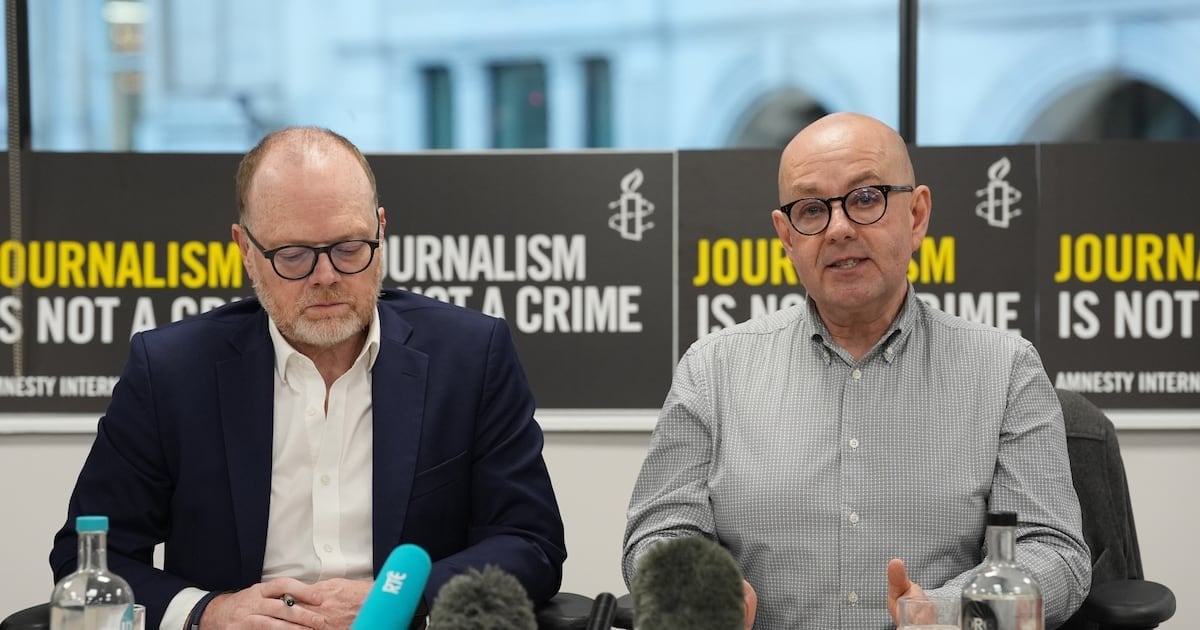
A journalist who was subjected to unlawful police surveillance has told how he is still the victim of a PSNI “whispering campaign”.
Barry McCaffrey was speaking during a hearing of the Northern Ireland Affairs Committee into press freedom in London on Wednesday.
The inquiry is also examining the extent of PSNI surveillance on journalists in the north.
Details of the spy operation directed against Mr McCaffrey, fellow journalist Trevor Birney and a former senior official at the Police Ombudsman’s Office came to light at the Investigatory Powers Tribunal last year.
The London-based body examines complaints from people who believe they have been the victim of unlawful covert interference by state agencies.
It looked at allegations the journalists were subjected to unlawful surveillance by the PSNI over their 2017 film about the 1994 Loughinisland atrocity.
Six Catholic men were shot dead in the UVF attack, which was later found to involve collusion.
In 2018 both journalists were arrested as part of a probe, led by Durham Constabulary, into a leaked document used in the film.
A court later ruled that the warrants used by police to search the journalists’ homes and the film company were “inappropriate”.
The PSNI later apologised and agreed to pay £875,000 in damages to the journalists and the film company.
As a result of the IPT process police have also been ordered to pay both journalists £4,000.
Speaking at a panel of MPs in London yesterday, Mr McCaffrey told how after his arrest he was stripped naked, DNA tested and photographed.
“What angers us the most is the whispering campaign that some within the PSNI are continuing right until this very day,” he said.
“Against Trevor and myself and against journalists in particular.
“When we were first arrested someone within the PSNI leadership were briefing that anybody who supported us, whether it was the Irish government, or political parties or trade unions, that they would be left with egg on their face.”
Mr McCaffrey said the same claims continue to be made.
“We are hearing the same thing again, eight years later, the PSNI have a whispering campaign going on, they are only telling half truths,” he said.
“To me that’s sad.”
Mr Caffrey said he has “confidence” in current chief constable Jon Boutcher, whom he described as “a decent and honourable man”.
“But the PSNI have to take a decision, either they keep on digging this hole, they are getting themselves into this mire of…obfuscation, withholding (information), a total disrespect for democracy.”
“Jon Boutcher has to decide today, ‘this has to stop’.
“Journalists aren’t criminals.”
In June last year the PSNI admitted making 823 applications for communications data for journalists and lawyers over a 13-year period from 2011-2024.
Weeks later it emerged that more than 4,000 phone communications between 12 journalists were monitored over a three-month period.
In response to the spy scandal, PSNI chief constable Jon Boutcher established the McCullough Review last year, which is headed by London based KC Angus McCullough, and will cover the period from 2011 – 2024.
National Union of Journalists representative Seamus Dooley, who is a member of the McCullough Review group of experts and stakeholders, raised concerns about the release of information from the PSNI to the IPT.
“The PSNI engaged in what I would describe as a form of judicial striptease,” he said.
“Where every day you walked in there was a new little piece presented…..I have never seen evidence presented in that absorbed manner."
Mr Birney said it was an “arbitrary decision” to set 2011 as the start date for the McCullough Review.
“That isn’t going to get to the bottom of where the spying operation emanated from, who ordered it, why and where indeed the culture that led to the incidents that we have seen at the IPT involving Barry and myself – where did all that from?”
SDLP leader Claire Hanna, who sits on the committee, said: “The culture of lawfulness we’re trying to create needs both a free press and trust in policing. It’s clear from today’s session that questions will remain after McCullough Review, and about the rigour of the Policing Board on this matter.”
The PSNI was contacted.
by HellaHaram
4 comments
People mock you for this, but the PSNI has an extensive intelligence apparatus that targets civilians. The PSNI data leak which was reported in the media showed they have a lot of officers working on behalf of MI5.
Is it any shock a service that engages in secret policing would conduct rogue operations without any political support?
If the British peelers in Britain were happy to spy on a future Prime Minister on behalf of Ronald McDonald, then the extent to which the British peelers in Ireland are operating must be limitless
As Trevor McBirney said; anyone who attempts to expose illegality, criminality and collusion involving the RUC, PSNI, NIO or British Government are themselves treated like they are criminals.
Whether they’re journalists, solicitors, civil rights activists……the police have a blank cheque and seemingly free rein to pursue, harass and smear them. Innocent civilians rights trampled on ***while*** the PSNI themselves delay, obfuscate, obstruct and use any methods at their disposal to block legacy investigations.
If there’s one other reason apart from protecting members of the RUC, Loyalists, Brit Intel, NIO and political Unionism and members of the British Government who were engaged in the murder of innocent civilians from facing justice then I can’t think of it.
Says he’s still a victim so he is.

Comments are closed.